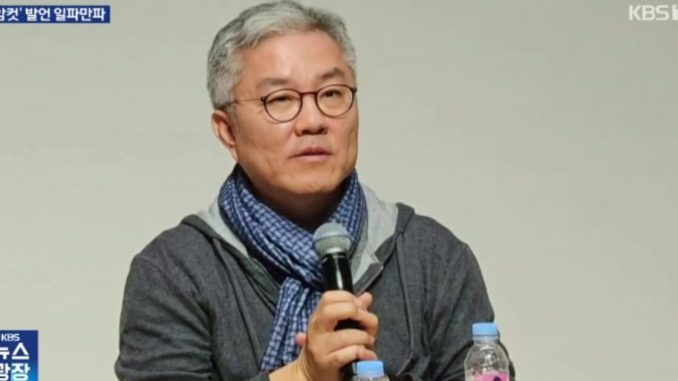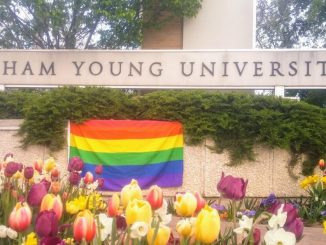
▲ Choi Gwang-wook, director of the Democratic Party of Korea’s Education and Training Institute, speaks at a Supreme Council meeting held at the National Assembly in Yeouido, Seoul, on the morning of August 22. ⓒNewsis
| Published September 5, 2025
Naju, South Korea — August 30, 2025 — Choi Kang-wook, head of the Democratic Party’s Education and Training Institute and a former lawmaker, is facing intense backlash after making inflammatory statements at a public book talk in Naju while promoting his work “Beneficial Conservatism, Righteous Progressivism.”
During the event, Choi lashed out at opposition supporters, derogatorily calling them “No. 2 voters” (referring to the ballot number of the People Power Party). He suggested that if all of them were gathered and “buried in one day, democracy would advance.” The remarks were widely interpreted as dehumanizing rhetoric against millions of South Koreans.
Choi also disparaged the Yeongnam region (which includes Daegu, Busan, and Gyeongbuk), claiming that people there “do not think about right and wrong” and dismissing their political choices as blind loyalty to past conservative leaders.
The comments, first reported in detail by the South Korean outlet NewDaily on September 4, quickly spread through international channels. By September 5, they were highlighted by outlets like The Gateway Pundit, framing the remarks as a reflection of the ruling party’s growing hostility toward its critics.
Adding to the controversy, Choi has been embroiled in separate scandals, including accusations of “secondary victimization” in connection with sexual harassment allegations involving Democratic Party figures.
Political Climate
Choi’s remarks land in the middle of one of the most turbulent years in South Korean politics in decades. In early 2025, the country witnessed a historic standoff when investigators attempted to arrest then-President Yoon Suk-yeol, leading to his eventual impeachment and removal from office. That episode deepened mistrust between rival camps and left the political landscape fractured.
The Democratic Party currently holds significant influence, but it faces growing criticism for heavy-handed tactics and polarizing rhetoric. On the other side, the People Power Party retains a strong regional base, particularly in the Yeongnam area, which Choi disparaged. This regional divide—between Yeongnam (traditionally conservative) and Honam (traditionally progressive)—has long shaped South Korean elections, but recent months have made the split more volatile.
Choi’s statements, therefore, are not seen in isolation. They reflect a broader struggle for dominance in a post-Yoon political era where emotions run high and partisan hostility is intensifying. Critics argue that such language risks normalizing political violence and alienating citizens who already feel marginalized in the democratic process.
Public Reaction
Choi’s comments sparked immediate backlash across the political spectrum and in the media.
-
Opposition Response: Lawmakers from the People Power Party denounced the remarks as “hate speech” and “a direct attack on democracy.” Several called for Choi’s resignation, arguing that any senior political figure who advocates metaphorically “burying” millions of citizens is unfit for public life. They accused the Democratic Party of fostering hostility instead of national unity at a time when the country faces major economic and security challenges.
-
Civil Society and Advocacy Groups: NGOs and civic organizations criticized Choi’s language as dehumanizing and dangerous, warning that such rhetoric could incite real-world hostility or violence. Groups focused on regional equality voiced particular concern about his comments toward Yeongnam residents, noting that dismissing entire populations based on geography only deepens long-standing divisions.
-
Media Commentary: South Korean press outlets ranged from outrage to cautious analysis. Conservative-leaning media amplified the remarks as proof of ruling-party arrogance, while centrist commentators argued that such words, even if hyperbolic, cross a red line for a democracy still recovering from the trauma of an impeachment crisis earlier in the year.
-
Public Sentiment: On social media, reactions were polarized. Critics expressed anger, with some Yeongnam residents demanding an apology, while Democratic Party loyalists downplayed the controversy, framing Choi’s statement as a rhetorical flourish meant to highlight frustration with entrenched conservative politics.
So far, Choi himself has not issued a formal apology, and the Democratic Party leadership has remained relatively quiet, a silence that critics say suggests tacit approval or at least unwillingness to discipline one of their own.
Significance
Choi Kang-wook’s remarks carry weight beyond a single controversial statement. They expose the fragile state of South Korea’s democracy at a moment when public trust in institutions is already weakened by the impeachment of President Yoon Suk-yeol and ongoing partisan clashes.
First, his comments highlight the erosion of political civility. By suggesting that millions of opposition voters should be “buried,” even metaphorically, Choi normalized the idea that entire groups of citizens are obstacles to progress rather than participants in democracy. Such rhetoric deepens polarization and risks inflaming tensions in a society already marked by sharp regional and ideological divides.
Second, the controversy underscores the power of regional politics. The Yeongnam–Honam divide has shaped South Korean elections for decades, and dismissive statements about Yeongnam voters could alienate an entire region, potentially altering national political calculations.
Finally, the episode illustrates the global dimension of domestic rhetoric. While the comments were made at a local book talk, they were quickly amplified by both Korean and international media. This reflects how political discourse in South Korea is increasingly scrutinized on the world stage, with implications for the country’s democratic image and political stability.
In short, Choi’s remarks are not just a gaffe—they symbolize the dangers of treating political opponents as enemies to be eliminated rather than citizens to be persuaded.
The YouTube video you’ve got there is the full recording of Choi Kang-wook’s book talk in Naju on August 30, 2025. It’s basically him on stage presenting ideas from his book “Beneficial Conservatism, Righteous Progressivism.” Now, in most parts, it feels like a pretty standard political lecture — Choi’s trying to sound intellectual, mixing humor with sharp critiques of his rivals.
But here’s where it takes a sharp turn: at one point, he starts talking about voters who supported the People Power Party (known as “2찍,” because their candidate number was 2 on the ballot). He really lays into them, saying they’re blind to right and wrong, they vote out of habit or loyalty, and then he drops that line:
👉 “If we gather every one of those ‘No. 2 voters’ and bury them all in one day, democracy would advance.”
Now, obviously, he didn’t mean literally digging graves that day. He was using exaggerated language to say Korea would be better off without that group of voters. But still — it’s harsh, dehumanizing, and shocking to hear a senior politician say it out loud. Imagine telling millions of people that the country would be better off if they just didn’t exist. That’s why it blew up in the media.
The audience in the room? They seemed to take it in stride, maybe even laughing a little, like they knew it was a jab meant for effect. But once that clip hit the news and spread, people outside the room weren’t laughing. It tapped into South Korea’s deep regional and political divides — especially the rivalry between Yeongnam (conservative stronghold) and Honam (progressive base).
So, if you and I were chatting casually, I’d say this: The video shows Choi trying to rile up his supporters with bold rhetoric, but in doing so, he crossed the line from criticism into outright hostility. It’s one thing to slam a party’s policies, but when you start talking about voters as if democracy would be better without them, you’re basically undermining the very idea of democracy.
 Implications
Implications
1. Democratic Principles at Stake
When a politician suggests that democracy would improve if millions of opposition voters disappeared, it cuts against the very foundation of democracy — pluralism. Even if said metaphorically, it sends a message that dissenting voices are obstacles to be eliminated, not fellow citizens to debate. That risks normalizing intolerance in politics.
2. Regional Division Deepening
Choi wasn’t just attacking the People Power Party; he tied his remarks to the Yeongnam region (Daegu, Busan, Gyeongbuk), saying voters there don’t think critically. This inflames the long-standing Honam–Yeongnam rivalry. Such rhetoric can entrench stereotypes and worsen national division, making reconciliation between regions even harder.
3. Political Fallout for the Democratic Party
-
Short-term: Opponents seize this as proof that the ruling party holds contempt for ordinary citizens. It gives the People Power Party a rallying point.
-
Long-term: If left unchecked, this can erode the Democratic Party’s credibility as a party of democracy and inclusivity. Silence from leadership could be seen as tacit approval.
4. Media and International Optics
South Korea already faces intense international scrutiny after the impeachment of President Yoon earlier this year. When a senior figure says democracy would be better without opposition voters, it plays into global narratives of polarization and democratic backsliding. This can harm the country’s democratic reputation abroad.
5. Danger of Escalating Rhetoric
Even if not meant literally, violent metaphors create a space where political hostility feels acceptable. History shows that dehumanizing language, if repeated often enough, can push supporters toward justifying more extreme actions. South Korea doesn’t want to slide into that territory.
 Overall Takeaway:
Overall Takeaway:
Choi Kang-wook’s comments in Naju are more than just a careless slip of the tongue. They reveal the arrogance and intolerance festering within South Korea’s Democratic Party. Instead of respecting the voices of millions of citizens, Choi openly fantasized about a democracy without them — a vision closer to authoritarianism than freedom.
This kind of rhetoric shows why the country remains bitterly divided. When political elites mock opposition voters as “dogs and pigs” or say democracy would be better if their rivals were “buried,” they aren’t defending democracy — they are undermining it. It’s the same dangerous logic used by those who see power as theirs alone and dissent as illegitimate.
The People Power Party and ordinary citizens who reject this contemptuous attitude now have a powerful case to make: democracy survives only when all voices are heard, not when one side tries to silence or erase the other. For South Korea to move forward, voters must hold leaders like Choi accountable and reject the culture of hate and division his remarks represent.





Be the first to comment